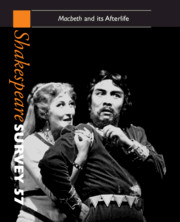Book contents
- Frontmatter
- Humane Statute and the Gentle Weal: Historical Reading and Historical Allegory
- Macbeth’s Knowledge
- ‘The Grace of Grace’ and Double-Talk in Macbeth
- Remind Me: How Many Children Had Lady Macbeth?
- Taking Macbeth out of Himself: Davenant, Garrick, Schiller and Verdi
- ‘Two truths are told’: Afterlives and Histories of Macbeths
- Doing All That Becomes a Man: The Reception and Afterlife of the Macbeth Actor, 1744–1889
- Macbeth and Kierkegaard
- Monsieur Macbeth: from Jarry to Ionesco
- The Politics of Sleepwalking: American Lady Macbeths
- Macbird! and Macbeth: Topicality and Imitation in Barbara Garson’s Satirical Pastiche
- Mick Jagger Macbeth
- ‘The Zulu Macbeth’: The Value of an ‘African Shakespeare’
- ‘A Drum, a Drum – Macbeth doth come’: When Birnam Wood moved to China
- The Banquet of Scotland (PA)
- Scoff power in Love’s Labour’s Lost and the Inns of Court: Language in Context
- Mercury, Boy Yet and the ‘Harsh’ Words of Love’s Labour’s Lost
- Shakespeare, Sir Thomas More and Asylum Seekers
- Hal as Self-Styled Redeemer: The Harrowing of Hell and Henry IV Part 1
- Mr Hamlet of Broadway
- Shakespeare Performances in England, 2003
- Professional Shakespeare Productions in the British Isles January–December 2002
- The Year's Contributions to Shakespearian Study 1 Critical Studies
- 2 Shakespeare in Performance
- 3 Editions and Textual Studies
- Books Received
- Index
The Banquet of Scotland (PA)
Published online by Cambridge University Press: 28 March 2007
- Frontmatter
- Humane Statute and the Gentle Weal: Historical Reading and Historical Allegory
- Macbeth’s Knowledge
- ‘The Grace of Grace’ and Double-Talk in Macbeth
- Remind Me: How Many Children Had Lady Macbeth?
- Taking Macbeth out of Himself: Davenant, Garrick, Schiller and Verdi
- ‘Two truths are told’: Afterlives and Histories of Macbeths
- Doing All That Becomes a Man: The Reception and Afterlife of the Macbeth Actor, 1744–1889
- Macbeth and Kierkegaard
- Monsieur Macbeth: from Jarry to Ionesco
- The Politics of Sleepwalking: American Lady Macbeths
- Macbird! and Macbeth: Topicality and Imitation in Barbara Garson’s Satirical Pastiche
- Mick Jagger Macbeth
- ‘The Zulu Macbeth’: The Value of an ‘African Shakespeare’
- ‘A Drum, a Drum – Macbeth doth come’: When Birnam Wood moved to China
- The Banquet of Scotland (PA)
- Scoff power in Love’s Labour’s Lost and the Inns of Court: Language in Context
- Mercury, Boy Yet and the ‘Harsh’ Words of Love’s Labour’s Lost
- Shakespeare, Sir Thomas More and Asylum Seekers
- Hal as Self-Styled Redeemer: The Harrowing of Hell and Henry IV Part 1
- Mr Hamlet of Broadway
- Shakespeare Performances in England, 2003
- Professional Shakespeare Productions in the British Isles January–December 2002
- The Year's Contributions to Shakespearian Study 1 Critical Studies
- 2 Shakespeare in Performance
- 3 Editions and Textual Studies
- Books Received
- Index
Summary
he is full so valiant,
And in his commendations I am fed;
It is a banquet to me
(Macbeth 1.4.56–8)Commending the victorious Macbeth with these lines, King Duncan sets up a model of mutual nourishment between lord and vassal, between political father and son. Duncan’s praise is commodiously ambiguous, potentially pointing both to other thanes’ reports of Macbeth’s valour as nourishment for Duncan and to Duncan’s advancement of Macbeth as itself a source of nourishment: by praising him, I am fed; his valour and my remarking that valour constitute the mise en place for concocting the comedic feast of successful community. ‘Banquet’ evokes both social and natural, both festive celebration and quotidian requirement. Being ‘fed’ – here in provocatively passive construction – also signals the way that food functions as a liminal substance that is both part and not part of the individual who ingests it, the way eating enacts both agency (the eater masticating, consuming, metabolizing the foodstuff) and dependence (without sustenance, no agent survives). All these resonances accrue to the dramatic logic of food as a leitmotif in Macbeth.
Billy Morissette’s film Scotland, PA (premiered at the 2001 Sundance festival and commercially released by Lot 47 films in 2002) playfully literalizes Duncan’s ‘banquet’, exploring these questions of agency and identity in the context of depressed – if officially only ‘recessed’ – 1970s rural America. This black comedy, Morissette’s first feature film, offers a surprisingly detailed and nuanced set of ways to think about identity and agency in both Macbeth and the 1970s.
- Type
- Chapter
- Information
- Shakespeare SurveyAn Annual Survey of Shakespeare Studies and Production, pp. 186 - 195Publisher: Cambridge University PressPrint publication year: 2004



